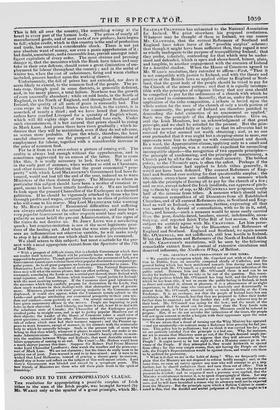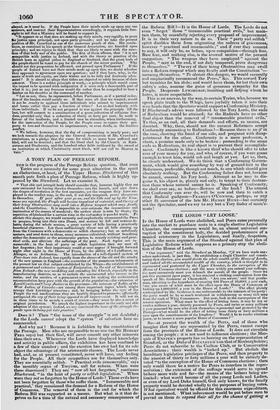included, presses hardest upon the working classes. is not compatible
with justice to Ireland, and with the theory and
Unfortunately, the fall of prices has not extended, nor does it practice of the British laws as applied either to England or Scot- seem likely to extend, to the common food of the people. The po- land, that the great body of the people should be taxed to pay for tato crop, though good in some districts, is generally deficient, the Church of the minor portion ; and that it is equally incompa- and, in too many places, a total failure. Nowhere was the growth tible with the principles of religious liberty that any man should of corn unusually abundant; while on cold lands, in the South of be compelled to pay for the ordinances of a church with which he England, in the North of England, and throughout Scotland and is not joined in communion : Secondly, that as, under the present Ireland, the quality of all sorts of grain is unusually bad. The application of the tithe composition, a tribute is levied upon the corn crops in the United States have failed, to the extent, it is whole nation for the uses of the church of only a tenth portion of asserted, of nearly a third ; and we have heard that American the community, the people of Ireland are therefore justified in orders have reached Liverpool for a quantity of English wheat, demanding the total extinction of an assessment so applied." which will fill eighty ships of two hundred tons each. Under Such was the principle of the Appropriation-clause. Give us, such circumstances, it is but natural that prices should be rising said the Irish Members, but an acknowledgment of that great in Mark Lane. And prices there have risen gradually ; which in- principle, and we shall be satisfied for the present. But the prin- dicates that they will be maintained, even if they do not advance, ciple was never stated fully or fairly; so that its advocates had to as seems more probable. Upon the whole, therefore, the least contend for what seemed not worth obtaining ; and, as no one careful observer may see the prospect of a great diminution of ever pretended that it was aught but a stepping-stone to more, our employment for labour, together with a considerable increase in opponents were free to charge us with concealment and deceit.
the price of common food. In a word, the Appropriation-clause, applying only to a small and
Far be it from us to over-colour a picture of corning evil. The even doubtful surplus, was a cowardly expedient for reconciling -reality is always bad enough without the apprehension, and is incompatible objects—the recognition of two opposite principles— sometimes aggravated by an excess of the latter. But in cases the principle of condemning, and the principle of maintaining, a like this, it is really necessary to look forward. We said so Church paid by all for the use of the small minority. The boldest in the early part of summer, when weather as cold as Christmas. policy, as the Chronicle says, is often the safest. Perhaps if the and other reasons for thinking that the great economical " pros- Appropriation-clause had applied to Irish tithes generally, it perity " with which Lord MELBOURNE'S Government had been fa- would not have been defeated. The earnest Reformers of Eng- soured, would not last till the end of the year, induced us to warn laud and Scotland care nothing for that questionable surplus : the Ministers of the then distant danger. The Minister to whom in Dissenters everywhere are indifferent about a measure which particular this subject should have been a matter of constant re. upholds the principle of forcing all to pay for the church of a few ; gard, seems to have been utterly heedless of it. We are inclined and no one, except indeed the Irish landlords, can approve of pitch- to look upon the present Chancellor of the Exchequer as a doomed ing to them by way of sop, as Mr.O.Conneu. now proposes, nearly politician. If he should be vigorously attacked by those who live half of the revenue from tithes. A measure which should inlist through profits and wages, certainly there is no class of politicians the warmest sympathies of all Dissenters from all Established who will come to his rescue. May Lord MELBOURNE take warning Churches, and of all earnest Reformers also, in Scotland and Eng- by Mr. RICE'S position ! Economical difficulties and suffering land as well as Ireland,—a measure, further, expressing all that are always attributed to the actual Government ; and none but a was meant by it, devoid of contradiction, with no lie in it, solid, very popular Government in other respects could bear such unpo- plain, and honest,—such a measure would be more easily carried pularity as must befall the present Administration, if the signs of than the poor, double-faced, baseless, unreal, indefensible, unsa- the times do not deceive us. ST. JOHN LONG was a murdering tisfying, and rejected Irish Tithe Bill of last session. On this quack ; but counter-irritation is one of the most legitimate prac- subject we entirely agree with Mr. CRAWFORD. Let him perse- tees of the healing art. And when the wise state physician fore- sere. He will be backed by the Dissenters and Reformers of sees an inflammation not otherwise curable, lie will make ready England and Scotland. England and Scotland, we again assure
confidence in Mr. O'Connell, but that they are prepared to follow their leader
session proved that he stood out for even more than the Tory Lords were
are we to assume that Ministers must go out, if the People demand ample jus- absurd and unjust. No Ministry will venture to advance unless the forward pressure be decided ; and to suppose if such a pressure were applied, that the
obeyed, as it must be. If the People have their minds made up upon any one measure, and instruct their Representatives accordingly, it requires little fore- sight to tell that a Ministry will be found to support it. "It appears to us that men are making up their minds, very rapidly, to press Sat. justice upon principle, not upon party grounds ; and we take the present position of Mr. Crawford as one of the numerous proofs of this. His resolu- tions, as contained in his speech at the General Association, are founded upon principle ; and we rejoice to think that they are likely to meet with the sanc- tion of that body and of the public. The first of them affirms, that ' it is not compatible with justice to Ireland, and with the theory or practice of the British laws as applied either to England or Scotland, that the great body of the people should be taxed to pay for the church of the minor portion.' Why should not this proposition be affirmed, and pressed upon Parliament ? If the people of Ireland 'have not their minds made up upon this, we doubt whether they approach to agreement upon any question ; and if they have, why, in the name of truth and equity, are their wishes not to be fully and fearlessly wlvo- sated ? It is absurd to allege that tithes are objected to solely because of their amount. There is a nobler principle at work,—a principle which would cause the impost to be spurned with indignation if it were only a thousandth part of what it is ; just as any freeman would die rather than be compelled to bear a feather on his shoulder at the command of another.
" Let us not, then, be represented, before Parliament, as if a partial reduc- tion of the burden would satisfy us. If that were all that we wanted, would it not be cruelty to applaud those individuals who submit to imprisonment and losses rather than pay a fraction of tithes ? Let us deal honestly with those individuals. If we be nut prepared to war against the principle till the last, but will consent to a continuation of a gross infraction of religious free- dom, provided only that a reduction of thirty or forty per cent. be made in favour of the landlords, and a limited sum be claimable, when forthcoming, for the instruction of the People, let the People cease to expose their pro- pertp to loss and themselves to imprisonment, or even death, in the fruitless conflict.
" We believe, however, that the day of compromising is nearly past ; and we look towards the adoption by the General Association of Mr. Crawford's resolutions, as a pledge that the cause for which so many have suffered and bled, will not be deserted ; and that the blood shed by the Church at Rath- cormac and Dunkerrin, and the hundred other fields reddened by the sword of an institution at which Christianity must blush, will not call to Heaven in Vain."



























 Previous page
Previous page